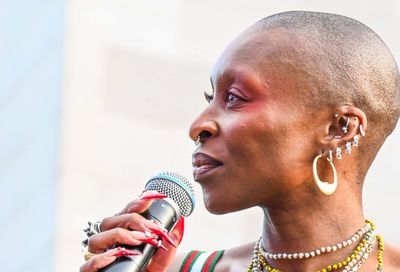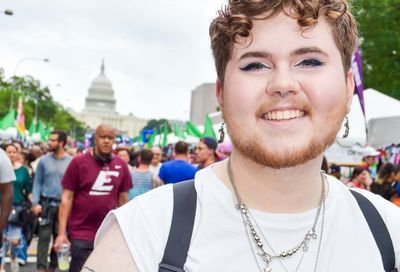Party of Hate: Where the 2024 GOP Candidates Stand on LGBTQ Issues
From Donald Trump to Tim Scott, we lay out several GOP presidential contenders’ views on LGBTQ issues and their chances of victory.

Republicans face a crowded field for the GOP nomination. The two frontrunners are former President Donald Trump and Florida Gov. Ron DeSantis, followed by former Vice President Mike Pence and former Ambassador to the U.N. Nikki Haley. We profiled the top twelve candidates and their track records on LGBTQ issues.
The first GOP primary will not occur until early January 2024. Still, the candidates are likely to take potshots at each other or make outlandish statements or statements as they jockey for position.
This year’s crop of candidates – like their fellow party members – seem particularly likely to demagogue on LGBTQ issues, in order to curry favor with the socially conservative voters that still comprise a large part of, and hold significant sway over, the Republican electorate.
The winner of the nomination will ultimately face incumbent President Joe Biden in the general election in November 2024.
Donald Trump
Former President Trump is notorious for his anti-LGBTQ views. During his presidency, he opposed the Equality Act, which aimed to explicitly protect against discrimination based on sexual orientation and gender identity by amending the Civil Rights Act of 1964.
His administration rolled back medical protections for LGBTQ individuals established under the Affordable Care Act. He also sought to weaken protections for unhoused transgender individuals, transgender students, and LGBTQ military service members, banning transgender troops from serving.
Trump appears unchanged in his years away from office, centering his campaign around similar messages and fear-mongering that echoes the messaging from his successful 2016 White House bid. This marks his third presidential run, and Politico considers him one of the two top candidates for the GOP nomination.
Ron DeSantis
Florida Governor Ron DeSantis gained national attention with his “Don’t Say Gay” bill, officially called the “Parental Rights in Education” bill. The bill bans classroom instruction on sexual orientation and gender identity in most public schools, with rare, narrowly-tailored exceptions for high school level science or sex education classes.
More recently, DeSantis signed the Treatments for Sex Reassignment Act of 2023 which grants state officials the authority to “take physical custody of a child” if they receive gender-affirming care. It also bans anyone under 18 from receiving gender-affirming care and suspends the licenses of healthcare professionals providing the treatment.
DeSantis signed other bills restricting individuals under 18 from attending drag shows, requiring transgender youth to use the bathroom that corresponds to their gender assignment at birth, and barring teachers from addressing students with their preferred pronouns.
DeSantis positions himself within the GOP as a less scandalous alternative to Trump, aiming to appeal to both center-right GOP voters and socially conservative Trump supporters. Politico considers DeSantis as one of the two top candidates for the GOP nomination.
Nikki Haley
The former governor of South Carolina and United States Ambassador to the United Nations, Nikki Haley believes Florida’s “Don’t Say Gay” bill does not go far enough. As governor of South Carolina, Haley actively opposed same-sex marriage. Haley opposes transgender youth from participating on sports teams matching their gender identity, and the use of pronouns that do not match a person’s assigned sex at birth, both of which she thinks “weaken” the country.
As U.S. ambassador to the United Nations, Haley, and President Trump, sent anti-trans and right-wing activist Bethany Kozma to represent U.S. interests at the United Nations Commission on the Status of Women.
While not a frontrunner, Haley is considered a viable alternative to Trump and DeSantis. Like DeSantis, her path to the White House lies in appealing to a wider GOP base over Trump fanatics. Some argue her anti-LGBTQ approach is an attempt to appeal to hard-right voters who favor Trump.
Mike Pence
Former Vice President Mike Pence has been an outspoken opponent of LGBTQ rights. He described same-sex couples and same-sex marriage as “societal collapse.” He argued that being gay was a choice and preventing same-sex marriage was an enforcement of “God’s idea.”
A former congressman, Pence worked against the repeal of Don’t Ask, Don’t Tell– a military policy that forced service members into the closet and prohibited any “homosexual conduct” while on tour (the policy was repealed in 2011). He opposed numerous laws and directives to prohibit LGBTQ discrimination while serving as both a member of the House of Representatives and as governor of Indiana.
Pence voted against the Employment Non-Discrimination Act of 2007 and opposed President Obama’s directive to let transgender students use the bathroom of their choice.
While a favorite among social conservatives, Pence has a narrow path to victory. He will likely gain popularity as the field thins before throwing his weight behind –- and, presumably, directing his supporters to back — a more viable candidate. While he does have more name recognition than Haley, he faces formidable challenges in gaining momentum against the other candidates.
Ryan Binkley
Ryan Binkley, President/CEO of a Private Equity firm and a pastor, publicly states on his church’s website that he believes marriage is “between one man and one woman.” Binkley opposes transgender individuals competing in sports events and skews heavily conservative on social issues. This longshot campaign is focused on Iowa. A failure there will likely result in the end of his campaign.
Doug Burgum
The two-term governor of North Dakota, Doug Burgum has generally opposed LGBTQ rights during his career, although he has not been as vocal on culture-war issues as some of his opponents. During his second term, Burgum signed a law requiring teachers to notify parents or legal guardians if a student identifies as transgender. It also allows teachers and the government to misgender individuals and prohibits students from using the bathroom of their choice without parental or guardian consent.
Burgum’s path to the White House is slim. He faces challenges similar to his other less prominent contenders and must leave a lasting impression on voters in a crowded field.
Chris Christie
The former governor of New Jersey, Chris Christie, announced his second presidential campaign. Christie has a mixed record on LGBTQ issues. While he continues to strongly oppose same-sex marriage, he expanded transgender rights during his governorship. He banned conversion therapy for anyone under 13, implemented strict anti-bullying measures, and prohibited health insurers from discriminating against consumers based on gender identity.
However, he vetoed two laws that would make it easier for transgender individuals to change the gender marker on their birth certificates.
Christie’s campaign revolves around being the loudest critic of Trump. With name recognition from his previous run, Christie’s path to the nomination rests on his ability to persuade a wider swath of Republican voters that he would be a more viable candidate in a general election against President Joe Biden.
Larry Elder
A former conservative radio talk show host, Larry Elder shows an extensive history of anti-LGBTQ remarks. He questioned whether the Pulse nightclub massacre was a hate crime and made derogatory comments about Ines Rau, the first transgender Playmate in Playboy magazine.
Elder is a staunch supporter of Trump and an opponent of the Black Lives Matter movement, denying the existence of systemic racism. After his landslide defeat trying to unseat California Governor Gavin Newsom in 2021, his path to the White House is slim to none.
Asa Hutchinson
Asa Hutchinson comes to this race with a lengthy public service career. He oversaw the Clinton impeachment, was a congressman, DEA administrator, and a two-term Arkansas governor. During his tenure, Hutchinson often opposed LGBTQ rights.
Hutchinson signed the Medical Ethics and Diversity Act of 2021 which allows medical professionals to deny treatment to LGBTQ people based on religious, moral, or ethical objections. He also signed the Fairness in Women’s Sports Act, which prevents transgender women from participating on female-designated sports teams. However, he is also generally skeptical of government interference in the area of parental rights, which led him to veto a bill to prohibit minors from accessing gender-affirming care.
However, his fellow Republicans in the legislature later overrode his veto, enacting the bill into law. Hutchinson’s campaign centers on a return to more traditional conservative values, and he admits his path to victory is a longshot.
Perry Johnson
Perry Johnson’s last campaign ended when he failed to get on the ballot for governor of Michigan in 2022.
He has made very few remarks concerning the LGBTQ community. He supports every individual’s right to live without discrimination and be free from violence. However, his campaign seems to be losing steam.
Vivek Ramaswamy
Like Perry Johnson, Vivek Ramaswamy is a longshot candidate funding his own campaign.
Ramaswamy has spread hate and misinformation about the LGBTQ community. He compared being a part of the LGBTQ community like joining a cult. His main focus is on attacking “wokeness,” but this seems unlikely to carry him to victory – especially since more widely-known candidates are already trumpeting the issue and getting more press for doing so.
Tim Scott
South Carolina Senator Tim Scott shares similar views with Pence on LGBTQ issues. Scott consistently opposes same-sex marriage and, in 2022, joined 20 other senators in signing a letter encouraging others to oppose the Respect for Marriage Act of 2022. He introduced the Parental Rights Over the Education and Care of Their Kids Act, which would cut funding for schools that allowed children to use locker room facilities that match their gender expression.
He supported the “Don’t Ask, Don’t Tell” policy and opposed both the Employment Non-Discrimination Act and the Equality Act that would increase protection for LGBTQ people. Scott is favored by wealthy GOP donors, like Larry Ellison and the Koch Network, and has no trouble fundraising.
While a longshot, Scott has become attractive to some Republicans who want to vote for someone who shares Trump’s and DeSantis’ views without their inflammatory personalities.
Support Metro Weekly’s Journalism
These are challenging times for news organizations. And yet it’s crucial we stay active and provide vital resources and information to both our local readers and the world. So won’t you please take a moment and consider supporting Metro Weekly with a membership? For as little as $5 a month, you can help ensure Metro Weekly magazine and MetroWeekly.com remain free, viable resources as we provide the best, most diverse, culturally-resonant LGBTQ coverage in both the D.C. region and around the world. Memberships come with exclusive perks and discounts, your own personal digital delivery of each week’s magazine (and an archive), access to our Member's Lounge when it launches this fall, and exclusive members-only items like Metro Weekly Membership Mugs and Tote Bags! Check out all our membership levels here and please join us today!




























You must be logged in to post a comment.